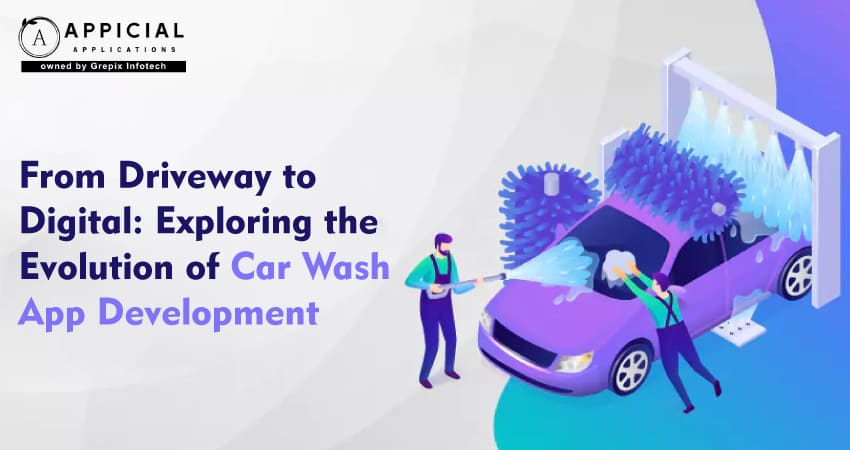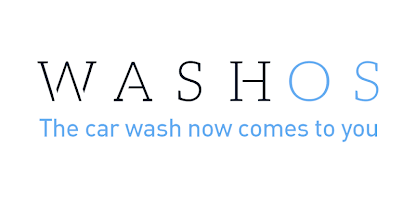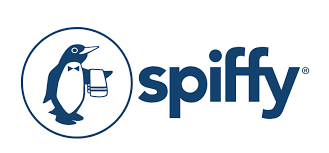
From Driveway to Digital: Exploring the Evolution of Car Wash App Development
In today’s fast-paced world, convenience is king. From grocery shopping to banking, technology has transformed mundane tasks into seamless digital experiences. The car wash industry, once dominated by manual labor and time-consuming processes, is no exception. The development of car wash applications represents a significant leap from traditional methods, where driveway washing and automated drive-throughs were the norms.
This blog delves into the dynamic evolution of car wash app development, tracing its journey from simple, manual efforts to sophisticated digital platforms that offer services at the touch of a button. We'll explore how these innovations have not only enhanced customer convenience but also revolutionized operational efficiencies, paving the way for a future where technology drives cleanliness.
The blog "From Driveway to Digital: Exploring the Evolution of Car Wash App Development" charts the transformation of the car wash industry from manual, labor-intensive operations to advanced, technology-driven digital solutions. Initially rooted in simple driveway washing and automated drive-throughs, the sector has embraced technological innovations like mobile apps, which offer unparalleled convenience by allowing users to book, customize, and pay for services via their smartphones. These advancements not only improve customer experience but also enhance operational efficiencies. The integration of IoT and AI further sophisticates these apps, making car washing a seamless part of the digital lifestyle while addressing challenges like diversity in device compatibility and data security.
The Early Days: Traditional Car Wash Models
In the early days, car wash models were straightforward and predominantly manual. Driveway washing was a common sight in residential areas, with vehicle owners armed with buckets, soap, and hoses taking on the task themselves. This method not only required physical effort but also a significant amount of time, turning it into a weekend chore for many. On the commercial front, drive-through car washes began to emerge, offering a more automated solution.
These facilities typically involved large mechanical brushes and high-pressure water jets to clean vehicles as they passed through a conveyor system. Despite being more efficient than manual driveway washing, these early commercial models still lacked the precision and customization that modern technology offers. The simplicity and limitations of these traditional car wash methods set the stage for the technological innovations that would later transform the industry.
Also Read: Launching Your Ride-Sharing Service: Why Consider an Indriver Clone?
Transition to Technology: The Initial Steps
The transition to technology in the car wash industry began as a response to growing consumer demands for convenience and efficiency, along with the advent of technological advancements. The initial steps were focused on automating the basic elements of the traditional car wash processes. This period saw the introduction of more sophisticated mechanical systems in drive-through car washes that could handle multiple aspects of cleaning more efficiently. These systems utilized automated rollers, brushes, and sprayers, which significantly sped up the washing process and reduced the reliance on manual labor.
Concurrently, the rise of computers and early-stage digital technology started to play a role in operational management. Car wash owners began implementing basic digital solutions to manage bookings, track customer preferences, and streamline services. This integration of technology not only improved operational efficiencies but also started to enhance the customer experience by reducing wait times and offering more consistent service quality.
These initial technological adoptions set the groundwork for more comprehensive digital integration, paving the way for the development of dedicated car wash applications and more sophisticated digital interactions in the car wash experience. This early adoption of technology marked the beginning of a significant evolution from manual labor to an automated, tech-driven service model that would continue to evolve and expand in scope.
The Rise of Mobile Apps: Convenience at Your Fingertips
The rise of mobile apps marked a pivotal shift in the car wash industry, aligning it with the broader trend of digital transformation across various sectors. As smartphones became ubiquitous, car wash businesses saw an opportunity to enhance customer engagement and streamline operations through mobile technology. The introduction of mobile apps allowed customers to experience unprecedented convenience by placing control directly in their hands.
These apps enabled users to locate nearby car wash services, schedule appointments, choose specific wash packages, and make payments, all from their mobile devices. The ability to book and pay for services in advance not only saved time but also allowed car wash businesses to manage their schedules and resources more efficiently, reducing idle times and increasing service turnover.
Moreover, these apps began to incorporate features that added value beyond mere convenience. Push notifications for appointment reminders, real-time status updates during the service, and the ability to leave feedback improved the overall customer experience. Loyalty programs and promotional offers, easily accessed through the app, fostered customer retention and increased user engagement.
This shift towards mobile-enabled convenience transformed the car wash industry from a task-based chore into a seamless part of the digital lifestyle, reflecting broader consumer expectations for services that are accessible, efficient, and integrated into their daily technology use.
Customization and User Experience: Enhancing the App Features
Customization in app development plays a pivotal role in enhancing user experience by tailoring features to meet individual preferences and needs. This personal touch not only makes the app more intuitive and user-friendly but also significantly boosts user engagement and satisfaction. For instance, allowing users to modify layouts, themes, and functionality according to their own workflow can transform a generic application into a vital daily tool. This level of customization ensures that the app adapts to the user, rather than forcing the user to adapt to the app. Furthermore, by incorporating feedback mechanisms within the app, developers can continuously refine and evolve the app's features, thereby maintaining relevance and delivering a dynamic user experience that resonates with a diverse user base. This approach not only retains existing users but also attracts new ones, creating a loyal and growing community around the app.
Integration with Smart Technologies: IoT and AI
Integrating smart technologies such as the Internet of Things (IoT) and Artificial Intelligence (AI) into applications can profoundly enhance their functionality and user experience. IoT allows devices to connect and exchange data, enabling applications to interact with the physical world in real-time. This connectivity can be leveraged in numerous ways, such as smart home apps that control lighting and temperature based on user presence or preferences, or health apps that monitor vital signs and suggest lifestyle changes.
AI adds another layer of sophistication by bringing predictive analytics, natural language processing, and machine learning to applications. This allows apps to offer personalized recommendations, anticipate user needs, and automate routine tasks, making them more intelligent and responsive. For example, AI can optimize routes for delivery apps based on traffic patterns, or provide customized news feeds in media apps based on user interests.
Together, IoT and AI can transform an application from a static tool into a dynamic assistant that enhances decision-making, increases efficiency, and improves everyday convenience. This integration not only elevates the user experience but also provides a competitive edge in an increasingly connected and automated world.
Challenges in Car Wash App Development
Car Wash App development presents a myriad of challenges, ranging from technical issues to market acceptance. One of the primary hurdles is designing for diversity, ensuring that the app works seamlessly across different devices, operating systems, and screen sizes. This requires meticulous testing and adaptation, which can be both time-consuming and costly.
User experience (UX) and user interface (UI) design are also critical, as they directly impact how users interact with the app. Striking the right balance between functionality and aesthetics without compromising performance is a delicate task. Additionally, developers must prioritize accessibility to cater to users with varying abilities, ensuring that the app is usable for everyone.
From a technical perspective, data security and privacy are paramount, especially with increasing regulations like GDPR and CCPA. Developers must implement robust security measures to protect sensitive user information and ensure compliance with these laws.
Scalability is another significant issue, as apps must be designed to handle varying loads smoothly. This can be challenging, particularly for startups that may not initially have the resources to build highly scalable systems.
Lastly, keeping up with rapidly changing technology and user expectations can be daunting. Continuous learning and adaptation are necessary to stay relevant. Moreover, after the app’s launch, developers face the challenge of ongoing maintenance and updates, responding to user feedback, and fixing any emerging issues promptly.
Navigating these challenges requires a well-planned development strategy, a focus on user needs, and a flexible approach to technology integration and market trends.
Case Studies: Success Stories in the Car Wash App Arena
The car wash app industry has seen some notable success stories that highlight how technology can transform traditional businesses. Here are a few examples of successful car wash apps and the strategies they employed:
Waashos

- Concept: Washos offers on-demand car wash and detailing services in major cities. The service allows users to choose from different packages and additional services, providing flexibility and customization.
- Success Factors: Washos distinguished itself with its dedication to eco-friendly cleaning products and processes, which resonated well with environmentally conscious consumers.
- Impact: The app has seen a steady increase in users and repeat business, indicating strong customer satisfaction and brand loyalty.
Spiffy

- Concept: Spiffy provides mobile car washing and detailing services that users can schedule through an app, targeting professionals who might need car services during their office hours.
- Success Factors: Spiffy’s integration of technology with logistics allowed them to efficiently manage a fleet of mobile service providers. They also focus heavily on corporate partnerships, which has helped in scaling operations.
- Impact: Spiffy has grown to serve multiple corporate campuses and has raised significant funding to expand further.
MobileWash

- Concept: MobileWash offers customized car wash services through an app, where users can select their preferred package and service provider.
- Success Factors: The app’s standout feature is its dynamic pricing model, which adjusts based on demand and service provider availability, benefiting both customers and providers.
- Impact: MobileWash is noted for its user-friendly interface and customer service, helping it expand rapidly in competitive markets.
Impact on the Environment and Sustainability
Digital car wash platforms have also contributed to environmental sustainability. By optimizing water usage and using eco-friendly cleaning agents, these apps promote greener practices. Data analytics helps in minimizing resource wastage, making digital car wash services not just convenient but also more sustainable.
The Future: What Lies Ahead
The future of car wash app development holds immense potential. With advancements in technology, we can expect even more personalized services, integration with smart city infrastructures, and the use of augmented reality (AR) for service demonstrations. Moreover, as electric vehicles become more common, specialized services for these cars will likely be developed.
Conclusion
In conclusion, the evolution of car wash app development from traditional driveway services to sophisticated digital platforms exemplifies the transformative power of technology in modern businesses. As we have seen, companies like Washos, Spiffy, and MobileWash have not only streamlined the process of getting a car washed but have also elevated the customer experience by offering unprecedented convenience and customization.
The success stories of these apps highlight several key trends: the importance of adapting to consumer needs, the potential of the gig economy in service industries, and the competitive advantage provided by eco-friendly and technologically innovative solutions. Moreover, these developments indicate a broader shift towards service on demand, which has become a defining characteristic of the digital age.
For entrepreneurs and developers, the journey from driveway to digital is filled with opportunities to innovate and redefine the customer service landscape. As the market continues to evolve, the potential for growth and expansion in the car wash industry remains vast. By embracing technology and focusing on customer satisfaction, future platforms have the chance to not only succeed but to thrive in this dynamic environment.
Launch your vision with our mobile app development company, where innovation meets excellence to create cutting-edge mobile solutions.





